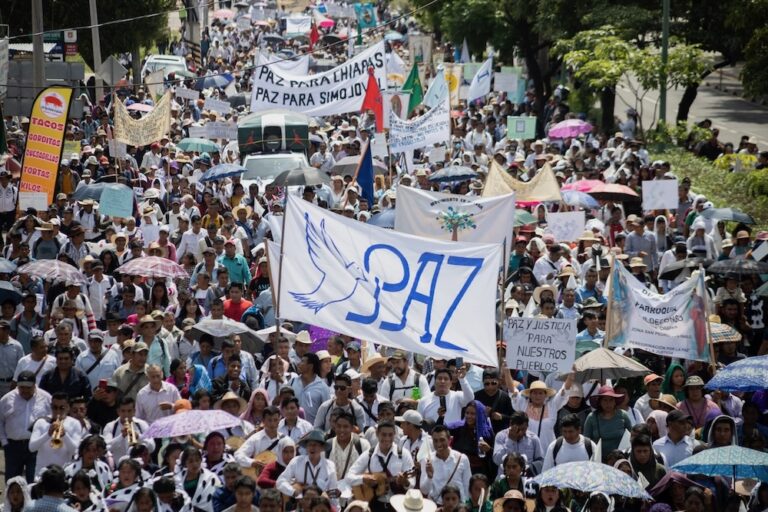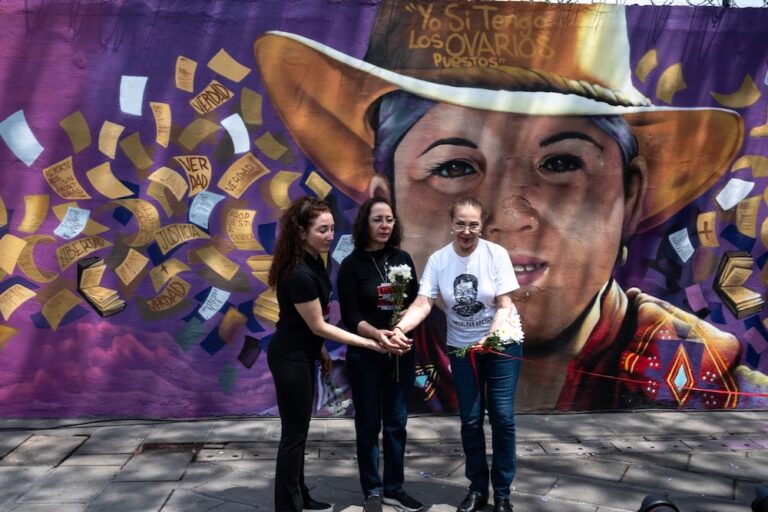ARTICLE 19 urges the CNDH to fulfil its obligations by reconsidering the complaint concerning NOTIMEX's director and her use of public resources to attack journalists and those critical of her management.
In May and June 2020, ARTICLE 19 Mexico and Central America in collaboration with Signa_lab from the Western Institute of Technology and Higher Education (Instituto Tecnológico y de Estudios Superiores de Occidente (ITESO) and Aristegui Noticias, published two reports that – based on testimonies, technical analysis and evidence from WhatsApp chat conversations – affirm that Sanjuana Martínez, director of NOTIMEX, used public resources to attack journalists and employees that had worked for her, as well as other people critical of her management.
On June 4, ARTICLE 19 Mexico, along with the victims, filed a complaint with the National Human Rights Commission (Comisión Nacional de Derechos Humanos, CNDH). A month later, NOTIMEX staff informed ARTICLE 19 that Sanjuana Martínez had ordered the deletion of the WhatsApp chats “Los Avengers”, “SOS” and “Fiesta Halloween”, as well as any other communication that demonstrated her participation in concerted actions against the journalists. For this reason, on July 8, we asked the CNDH to order measures to safeguard the evidence.
On Saturday, February 27, 2021, ARTICLE 19 Mexico were notified by the CNDH of the conclusion of the complaint file CNDH/6/2020/4811/Q. More than eight months have passed since ARTICLE 19 Mexico filed a complaint with the CNDH on behalf of the journalists and former employees whose rights had been violated by NOTIMEX.
The CNDH decided to no longer consider the complaint, considering the justifications and answers of the news agency sufficiently exculpatory, without taking into account the evidence and testimonies we provided. Moreover, the CNDH completely ignored the reports and findings of Signa_lab of ITESO, and the journalistic investigations of Aristegui Noticias. Most seriously, it concluded its consideration of the complaint without contacting or interviewing all the complainants or even verifying NOTIMEX’s statements.
Finally, while the CNDH waited more than four months for NOTIMEX’s response, it decided not to wait for the completion of the investigation conducted by the news agency’s Internal Control Organ. For these reasons, ARTICLE 19 and the complainants request that the complaint be reconsidered and investigated impartially and in accordance with human rights.
The current irregularities committed by the CNDH can be summarized as follows:
1) Investigative omissions by not requesting more information from victims, witnesses, and other public authorities;
2) Failure to integrate information from the reports published jointly by Aristegui Noticias, Signa_lab and ARTICLE 19, or to request more information from the various participating institutions;
3) Providing unjustified extensions for NOTIMEX’s reply period;
4) Concluding the complaint by adopting NOTIMEX’s version as its own, without contrasting it with other existing evidence;
5) Failure to ensure that the required evidence was secure;
6) Reduction of human rights violations to a mere labour conflict between employees, and ignoring how the complainants’ rights of free expression were impinged upon;
7) Mistreatment of the victims, reflected in CNDH’s not notifying complainants of pertinent information, and providing misleading or biased information; and
8) Alexander Francisco Brewster Ramírez, the public servant who concluded the claim, resigned from his position last December after it became public that he had falsified his educational and professional history.
The CNDH’s actions are far from its role of defending, promoting and protecting human rights. The CNDH has shown no signs of real change during the current administration. What the problematic investigation and mistreatment of victims in the NOTIMEX case demonstrates is the institutional degradation of the CNDH. We regret to note that the CNDH has retreated into old patterns of co-optation and simulation. For this reason, the objectivity and impartiality of this human rights protection institution is in question, since its actions during this investigation lacked the commitment, thoroughness, and professionalism that is demanded by the investigation of human rights violations.
For the above reasons, ARTICLE 19 Mexico and Central America request:
– That CNDH fulfil its obligations by reconsidering the complaint and investigating it impartially and in accordance with human rights principles.
– That Congress intervene and summon Rosario Piedra Ibarra, head of the CNDH, to appear before it in order to guarantee that the CNDH is able to fulfil its obligations autonomously.



